Every person should try to do umrah if they are physically fit. Although this is a spiritual journey, yet it requires a lot of physical effort. When you perform umrah, all your sins are forgiven and you get reward from Allah that is equivalent to Hajj. The rewards and blessings of doing umrah are countless. So you need to make good preparation for this journey.
Churchgist will give you all you ask on how to do umrah in urdu, how to wish someone going for umrah in arabic and so much more.

umrah prayers in urdu
Physical Purity
Before getting changed into the Ihram garments, take care of your personal hygiene by clipping your nails and removing the hair under your armpits and beneath the navel. You should then do Ghusl, a highly emphasised Sunnah for those intending to enter into a state of Ihram. If you can’t perform Ghusl, doing Wudhu will suffice. Men may apply Attar/perfume to their heads/beards, ensuring not to get any on the Ihram garments. This should all be carried out at your place of residence before your flight (assuming you’re flying).
Ihram Garments
You will then get changed into your Ihram garments which for men consists of two, normally white, clean seamless pieces of cloth. The sheet which wraps around the waist covering the lower body is known as the Izar and the sheet that is draped over the upper body like a shawl is known as the Rida. Sandals shouldn’t cover the heel and ankle. The Hanafi school of thought also stipulates that the top part of the foot should also remain exposed.
Ensure you put on your Ihram attire before crossing the designated Miqat. You will likely be travelling to Saudi Arabia via plane, so it is advisable to get changed into your Ihram at the airport prior to departure or during a stopover if you have one. Check-in first and get changed in the prayer room or bathroom. Alternatively, you can put on your Ihram in-flight although bear in mind that aeroplane bathrooms are usually very limited in space and there may well be a rush of people intending to do the same thing as the Miqat approaches. If you decide to slip into your Ihram attire on the plane, do so at least an hour before the Miqat is crossed.
Main article: Miqat
You may delay making your intention until the Miqat approaches. Just before crossing, remove any articles of clothing that you may still be wearing that violate the conditions of Ihram such as socks, headwear and underwear.
Women aren’t required to conform to a specific dress code. Clothing should be normal modest Islamic dress with a head covering of any colour. Hands and faces must remain exposed although socks may be worn.
Note: if you’re going to Madinah before Makkah, you don’t need to enter into the state of Ihram at this point. You will do so after your stay in Madinah.
Salah al-Ihram
It’s Sunnah to perform two Rakahs of Salah before entering into the state of Ihram. This can be performed after getting changed at the airport or in-flight before crossing the Miqat providing there are prayer facilities on-board. Observe the prayer with the intention of performing two Rakahs Nafl for Ihram.
Since you’re not yet in the spiritual state of Ihram, the prayer may be observed with the head covered. It is recommended to recite Surah al-Kafirun (Surah 109) in the first Rakah and Surah al-Ikhlas (Surah 112) in the second, although other Surahs may be read. Don’t forget to make Dua after this Salah.
Niyyah
The Niyyah for Umrah should be made at the Miqat or close to it as you move in its direction. Ideally, you should delay making the intention until the last moment so you aren’t restricted by its prohibitions for longer than need be. It is recommended (Mustahabb) that you make the intention verbally, as well as reiterating it internally.
Tamattu’: A pilgrim wears Ihram for Umrah only during the months of Hajj, which means when he reaches Makkah, he makes Tawaf and Sa’yi for Umrah. He then shaves or clips his hair. On the day of Tarwiya, which is the eighth of Dhul-Hijja, he puts on his Ihram for Hajj only and carries out all of its requirements.
Ifraad: A pilgrim wears Ihram for Hajj only. When he reaches Makkah, he performs Tawaf for his arrival and Sa’yi for Hajj. He doesn’t shave or clip his hair as he doesn’t disengage from Ihram. Instead, he remains in Ihram till after he stones Jamrah Al-Aqaba on the Eid day. It is permissible for him to postpone his Sa’yi for Hajj until after his Tawaf for Hajj.
Qiran: A pilgrim wears Ihram for both Umrah and Hajj or he wears Ihram first for Umrah, then makes intentions for Hajj before his Tawaf for Hajj. The obligations on one performing Ifraad are the same as those on one performing Qiran, except that the latter must slaughter whereas the former is not obligated to do so. The best of the three forms is Tamattu’. It is the form that the prophet (may the peace and blessings of Allah be upon him) encouraged his followers to perform. Even if a pilgrim makes intentions to perform Qiran or Ifraad he is allowed to change his intentions to Tamattu’; he can do this even after he has performed Tawaf and Sa’yi.
When the Prophet (may the peace and blessings of Allah be upon him) performed Tawaf and Sa’yi during the year of the Farewell Hajj with his companions, he ordered all those who hadn’t brought sacrificial animals to change their intentions for Hajj to intentions for Umrah. cut their hair, and disengage from Ihram till Hajj. He said, ” If I hadn’t brought the sacrificial animal, I’d have done what I’ve ordered you to do.”
The Umrah
If a pilgrim wishes to be ritually pure for Umrah, he should shed his clothing and bathe as he would after sexual defilement, if convenient. He should perfume his head and beard with the best oil he can find. There is no harm in what remains of it after Ihram.
Bathing for Ihram is Sunnah for both men and women, including menstruating women and those experiencing postnatal bleeding. After bathing and preparing himself, a. pilgrim, other than those menstruating or experiencing postnatal bleeding, prays the obligatory prayer, if it is time. Otherwise, he makes his intention by praying the two Sunnah Rakass which are made each time Wudhu is performed.
When he finishes his prayer he should say: “Here I am for Umrah, here I am, Oh Allah, here I am. Here I am. You have no partner. Here I am. Surely all praise, grace and dominion is yours, and you have no partner.” [Talbeeyah].
A man raises his voice when saying this and a woman says it so that only one beside her may hear her.
One in Ihram should say the Talbeeyah as often as possible, especially when times and places change. For example: when descending or ascending during travel or when day or night approach. He should also ask Allah for His pleasure, for Heaven and seek refuge in Allah’s mercy from Hellfire.
One should say the Talbeeyah during Umrah, starting from the time he puts on his Ihram till he starts Tawaf. During Hajj he should say it starting from the time he puts on his Ihram till he starts to stone Jamrah Al-Aqaba on the Eid day.
When a pilgrim enters the Holy Mosque he puts forth his right foot first and says: “In the name of Allah, may peace and blessings be upon the Messenger of Allah. Oh Allah, forgive me my sins and open to me the doors of Your mercy. I seek refuge in Allah the Almighty and in His Eminent Face and in His Eternal Dominion from the accursed Satan.”
He approaches the Black Stone, touches it with his right hand and kisses it. If this isn’t possible, he should face the Black Stone and point to it.
It is best not to push and shove, causing harm and being harmed by other people.
When touching the Stone, a pilgrim should say the following: “In the name of Allah, Allah is the greatest. Oh, Allah, with faith in you, belief in Your book, loyalty to you, compliance to the way of your Prophet Muhammad (may the peace and blessings of Allah be upon him).”
A pilgrim must walk, keeping the Ka’bah on his left. When he reaches the Rukn Al Yamani he should touch, but not kiss it, and say: ” Our Lord, grant us good in this life and good in the hereafter and save us from the punishment of the Hell fire. Oh Allah, I beg of You for forgiveness and health in this life and in the Hereafter.”
Each time he passes the Black Stone he should say: “Allah is the Greatest.”
During the remainder of his Tawaf he may say what he pleases of supplications, mentioning Allah, and recitation of Quran. This is because Tawaf, Sa’yi, and Stoning the Jamrah have been devised for the purpose of mentioning Allah.
During this Tawaf it is necessary for a man to do two things:
1. Al-ldhtebaa’ from the beginning of Tawaf until the end. Al-ldhtebaa’ means placing the middle of one’s Reda’ under his right arm and the ends of it over his left shoulder.
When he is finished performing Tawaf, he may return his Reda’ to its original state because the time for Idhtebaa’ is only during Tawaf.
2. Al-Raml during the first three circuits. Al-Raml means speeding up one’s pace with small steps. A pilgrim should walk at a normal pace during his last four circuits.
When he completes seven circuits of Tawaf, he approaches Maqam Ibrahim and recites: “And take ye the station of Abraham as a place of Prayer” Chapter 2, Verse 125 [2:125].
He prays two short Rakaas, as close as conveniently possible, behind Maqam Ibrahim. During the first Rakaa he recites Surah Al-Kafirun [Chapter 109] and during the second one Surah Al-lkhlas[Chapter 112].
When he completes the two Rakaas he should return to the Black Stone and touch it, if convenient. He goes out to the Mesa’a and when he nears As-Safaa he recites: ” Verily As-Safaa and Al-Marwah are among the shrines of Allah ” [2:158].
He ascends As-Safaa until he is able to see the Ka’bah. Facing the Ka’bah and raising his hands, he praises Allah and makes any supplications he chooses. The Prophet (may the peace and blessings of Allah be upon him) prayed thus: “There is no Deity but Allah alone,” three times, supplicating in between.
He descends As-Safaa and heads for Al-Marwah at a normal pace until he reaches the green marker. He should then run fast until the next green marker. He continues toward Al-Marwah at a normal pace. When he reaches it, he ascends it, faces the Qibla, raises his hands and repeats what he said on As-Safaa. He descends Al-Marwah heading towards As-Safaa, taking care to walk where walking is designated, and run where running is designated.
He continues this procedure until he completes seven laps. Going from As-Safaa to Al-Marwah is a lap and returning is another lap.
During his Sa’yi he may recite what he wills of supplications, recitation of Qur’an, and mentioning Allah.
In completion of Sa’yi he shaves his head. A woman clips her hair the length of a finger tip.
Shaving is preferable, except when Hajj is near and there isn’t sufficient time for hair to grow back. In this case it’s best to clip so that hair will remain for shaving during Hajj.
With that, Umrah is completed. and a pilgrim is free to dress in other clothing, wear perfume and engage in marital relations, etc.
The Hajj
In the forenoon of the eighth day of Dhul-Hijja, a pilgrim purifies himself once again by bathing as he did before Umrah in the place in which he is staying, if convenient. He puts on his Ihram and says: ” Here I am for Hajj. Here I am, oh Allah, here I am. Here I am. You have no partner. Here I am. Surely all praise, grace and dominion is yours, and you have no partners.”
If he fears that something will prevent him from completing his Hajj he should make a condition when he makes his intentions, saying: ” If I am prevented by any obstacle my place is wherever I am held up.” If he has no such fear, he doesn’t make this condition.
A pilgrim goes to Mina and there prays Dhuhr, Asr, Magrib, Isha and Fajr, shortening his four unit prayers so as to make them two units each, without combining them.
When the sun rises, he goes to Arafah and there prays Dhuhr and Asr combined at the time of Dhuhr, making each one two units. He remains in Namira Mosque until sunset if possible. He remembers Allah and makes as many supplications as possible while facing the Qibla.
The Prophet (may the peace and blessing of Allah be upon him) prayed thus: “There is no Deity but Allah alone. He has no partner. All dominion and praise are His and He is powerful over all things.
If he grows weary it is permissible for him to engage in beneficial conversation with his companions or reading what he can find of beneficial books, especially those concerning Allah’s grace and abundant gifts. This will strengthen his hope in Allah.
He should then return to his supplications and be sure to spend the end of the day deep in supplication because the best of supplication is the supplication of the day of Arafah.
At sunset he goes from Arafah to Muzdalifah and there prays Magrib, Isha, and Fajr. If he is tired or has little water, it is permissible for him to combine Magrib and Isha. If he fears that he will not reach Muzdalifah until after midnight, he should pray before he reaches it for it is not permissible to delay prayer until after midnight. He remains there, in Muzdalifah, making supplications and remembering Allah till just before sunrise.
If he is weak and cannot handle the crowd during Ar-Ramy, it is permissible for him to go to Mina at the end of the night to stone the Jamrah before the arrival of the crowd.
Near sunrise, a pilgrim goes from Muzdalifah to Mina. Upon reaching it he does the following:
a) He throws seven consecutive pebbles at Jamrah Al-Aqaba which is the closest monument to Makkah, saying Greatest,” as he : “Allah is the throws each pebble.
b) He slaughters the sacrificial animal, eats some of it, and gives some to the poor. Slaughter is obligatory on the Mutamati and Qiran.
c) He shaves or clips his hair; shaving is preferable. A woman clips her hair the length of a finger tip.
These three should be done in the above order if convenient, but there is no restriction if one precedes another.
With that, one is allowed to come out of Ihram. He can wear other clothing and do everything that was lawful before Ihram except engaging in marital relations.
He goes to Makkah to perform Tawaf Al-lfadha and Sa’yi, also for Hajj. It is Sunnah to put perfume on before going to Makkah.
With the completion of this Tawaf and Sa’yi, a pilgrim is allowed to do everything that was lawful before Ihram, including engaging in marital relations.
After performing Tawaf and Sa’yi, he returns to Mina to spend the nights of the eleventh and twelfth days there.
He stones the three Jamrah in the afternoon of both the eleventh and twelfth days. He starts with the first Jamrah, which is furthest from Makkah, then the middle one, and lastly Jamrah Al-Aqaba. Each one should be stoned with seven consecutive pebbles accompanied by Takbeer. He stops after the first and middle Jamrah to make supplications facing the Qibla. It is not permissible to stone before noon on these two days. It is best to walk to the Jamrah, but riding is permissible.
If he is in a hurry after stoning on the twelfth day, he leaves Mina before sunset. But if he wishes to prolong his stay, which is best, he spends the night of the thirteenth in Mina and stones that afternoon in the same manner as on the twelfth day.
When he is ready to return to his country, he makes Tawaf Al-Wadaa, which is seven circuits around the Ka’bah. Menstruating women and women experiencing postnatal discharge are not obligated to perform Tawaf Al-Wadaa.
how to wish someone going for umrah in arabic
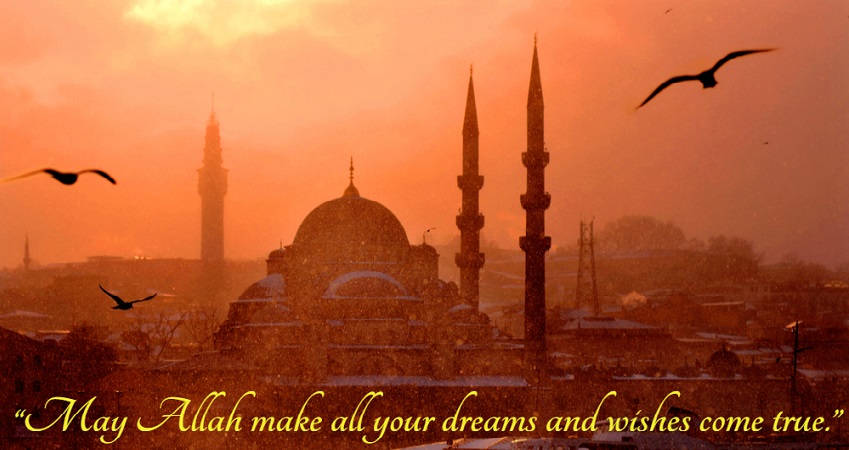
If you are not sure about how to wish someone going for Umrah, here’s a list of key duas that you can say for them, and ask them to say for you while they are in the house of Allah.
The Umrah pilgrimage is a blessed invitation by Allah Himself and an honour for every Muslim man and woman. The journey comprises a set of rituals that aid physical, mental and emotional cleansing. It is performed with the sole intention of seeking forgiveness for past sins and Ibadah, and is very much respected and valued all over the world.
If someone is going for Umrah, they usually seek time with their family, neighbours, friends, mentors and teachers. It is suggested that well-wishers must see them before they leave in order to wish them luck and blessings, offer salah, embrace them with the intention of forgetting and forgiving old grudges. If you cannot visit them, it is recommended to make dua for them. It is also an opportunity to offer help to and earn the reward for yourself since no good deed goes waste in the sight of Allah.
What to do if someone is going for Umrah?
1. Offer assistance: There are several things to take care of before one departs for their Umrah journey. It could be managing kids while they are gone, helping out with essential chores, monetary help or any other kind of assistance. It is recommended to ask those going for Umrah about how you can help to make their journey smoother.
As mentioned in Surah al Rehman (the 55th Chapter of the Qur’an with 78 verses) 55:60, “What is the recompense of goodness, but goodness?”
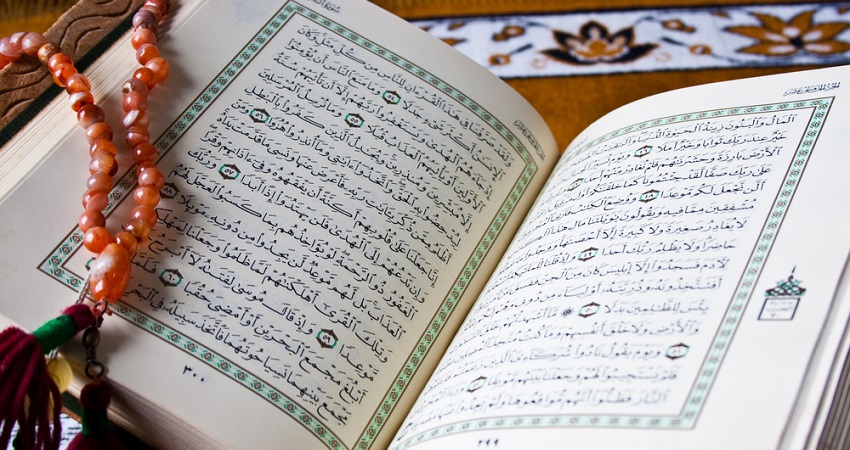
2. Help them to make a list of prayers: Everyone needs a list of duas and prayers for their Umrah journey. As a well-wisher, you may help them put together prayers for different stages of the journey. Urge them to make dua for all their loved ones.
3. Ask them to pray for you: According to Sunnah, it is recommended to ask your family and friends to pray for you. While going for Umrah or Hajj, a person is off on a spiritual journey to Allah, so ask them to pray for you as prayers are answered while in travel to and at the Kaaba.
In the chapters of Hajj rituals of Sunan Ibn Ma’ja, Abu Hurayrah narrated that Allah’s Apostle PBUH said “From one Umrah to another is expiation for sins that came in between them. And Hajj Mabrur brings no less reward than Paradise”. Further, one can offer Umrah Mubarak wishes to someone going to perform Umrah in the near future.
Umrah dua for safe journey
بِسْـمِ اللهِ وَالْحَمْـدُ لله، سُـبْحانَ الّذي سَخَّـرَ لَنا هذا وَما كُنّا لَهُ مُقْـرِنين، وَإِنّا إِلى رَبِّنا لَمُنـقَلِبون، الحَمْـدُ لله، الحَمْـدُ لله، الحَمْـدُ لله، اللهُ أكْـبَر، اللهُ أكْـبَر، اللهُ أكْـبَر، سُـبْحانَكَ اللّهُـمَّ إِنّي ظَلَـمْتُ نَفْسي فَاغْـفِرْ لي، فَإِنَّهُ لا يَغْفِـرُ الذُّنوبَ إِلاّ أَنْـت
“With the Name of Allah. Praise is to Allah. Glory is to Him Who has provided this for us though we could never have had it by our efforts. Surely, unto our Lord, we are returning. Praise is to Allah. Praise is to Allah. Praise is to Allah. Allah is the Most Great. Allah is the Most Great. Allah is the Most Great. Glory is to You. O Allah, I have wronged my own soul. Forgive me, for surely none forgives sins but You”.
How to wish someone going for Umrah?
Here are a few Umrah wishes for those going for Umrah:
4. “May Allah’s blessings light your way, strengthen your faith and bring joy to your heart as you praise and serve Him today, tomorrow and always.”
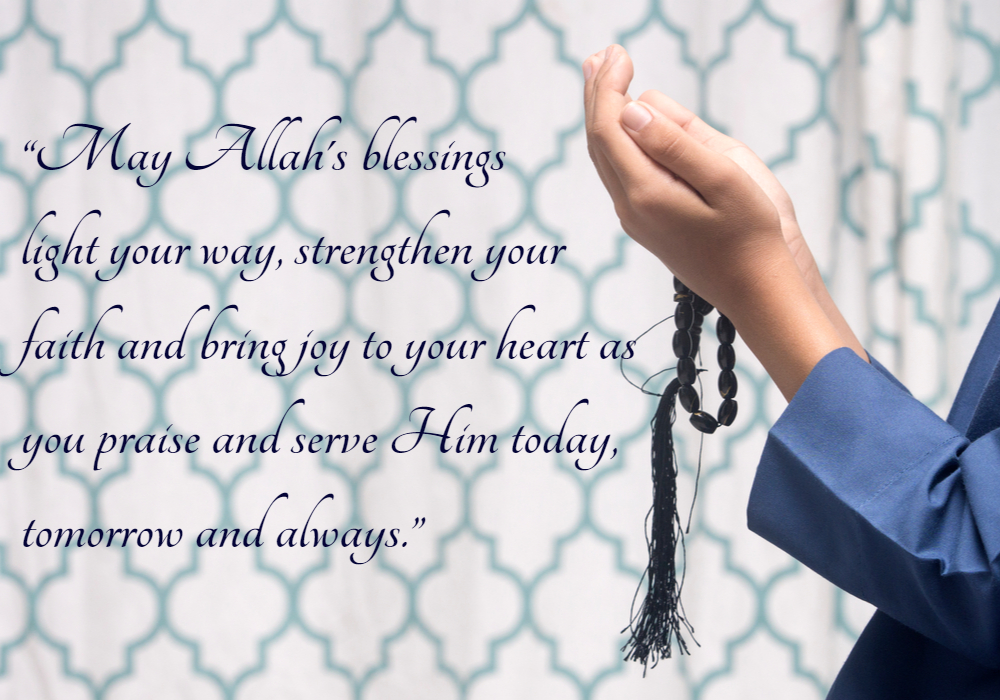
5. “May Allah accept your Dua and may He be pleased with you. May you be filled with joy and happiness!”
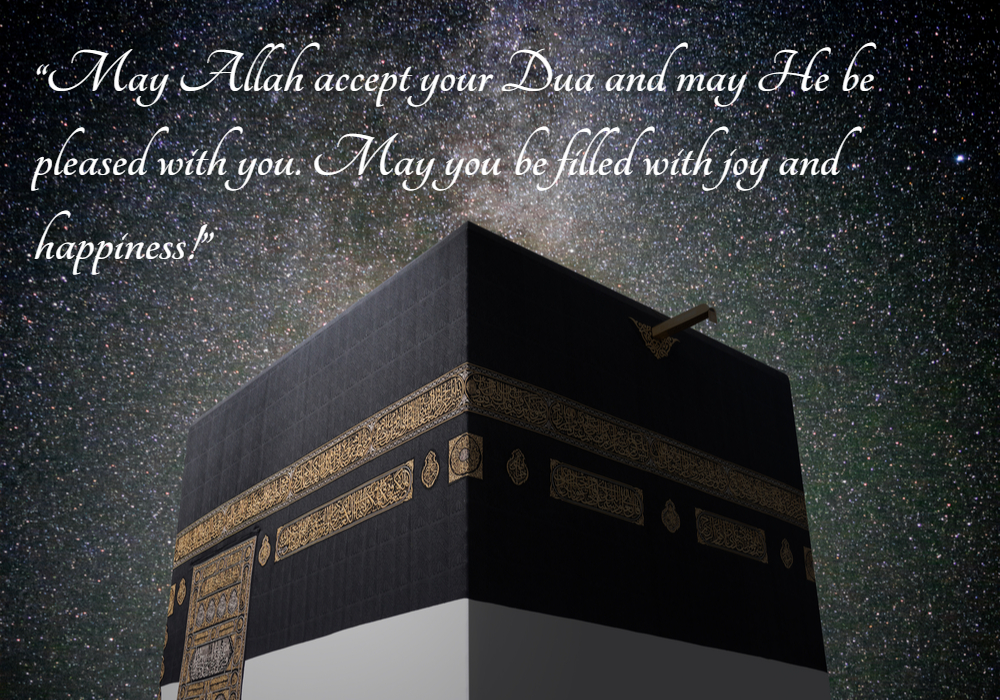
6. “May Allah make all your dreams and wishes come true.”
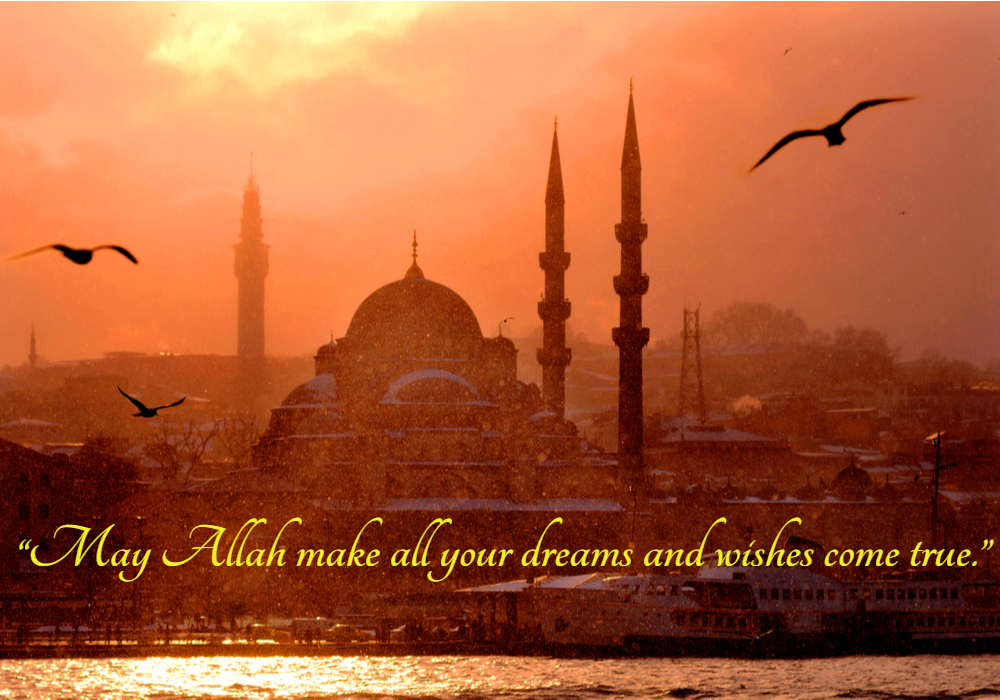
7. “You are blessed to be celebrating today. I wish to send you my warmest heart-filled greetings and wish you and your family the best that this day can offer.”
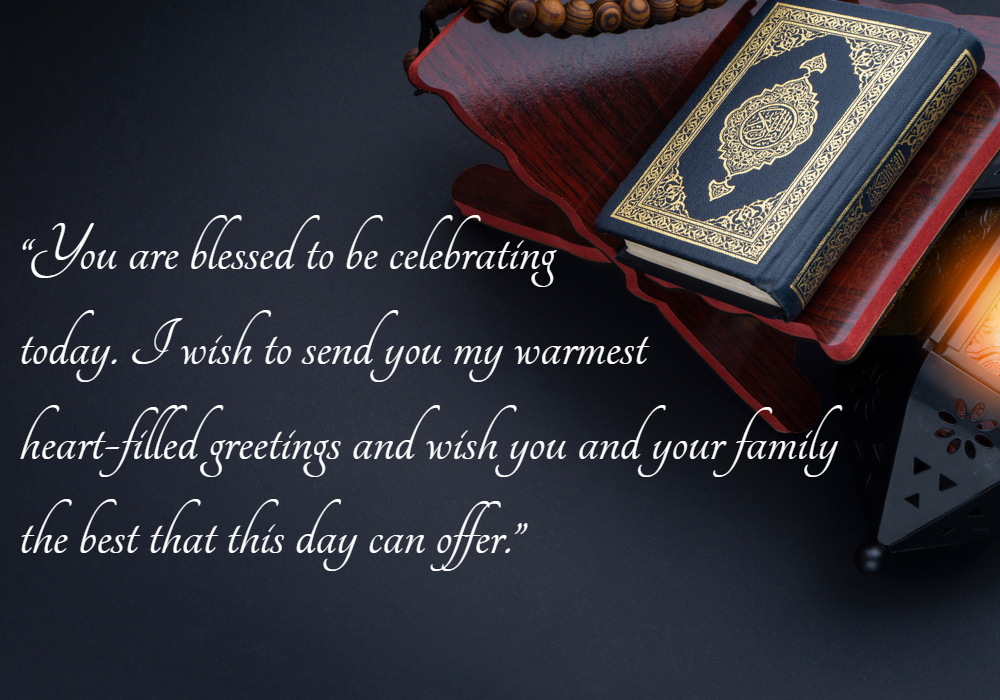
8. “May God take you and bring you back safely.”
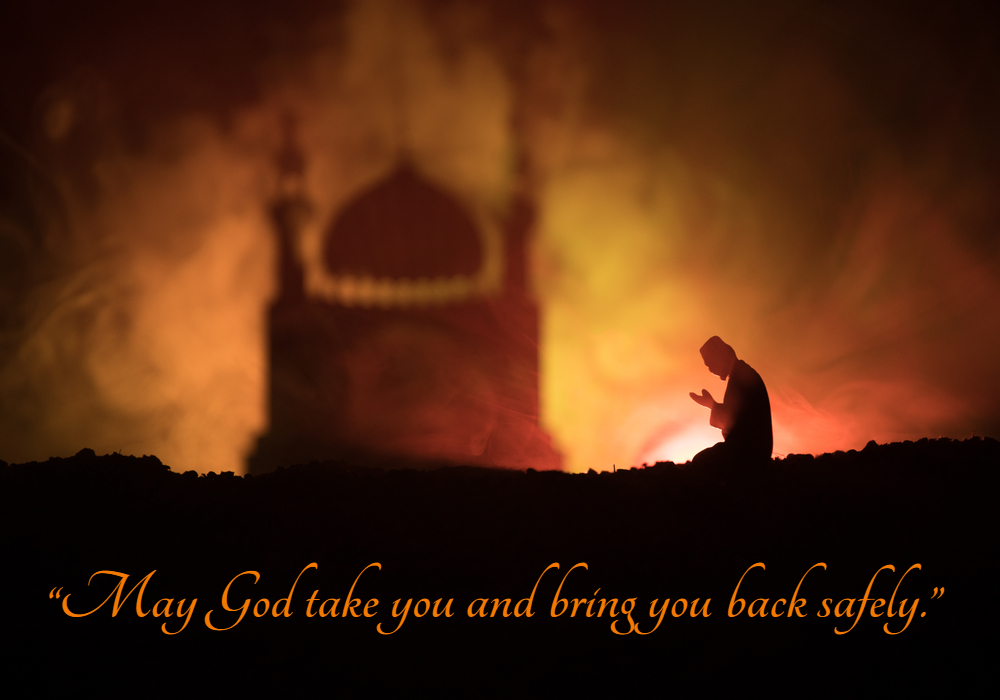
9. “Spend as much time on prayer, self-reflection and seeking forgiveness; minimise the time spent on shopping and frivolous socialising.”

10. “May Allah today grant all your wishes. May he flood your life with happiness and joy with this Umrah… Wishing you a happy Umrah”
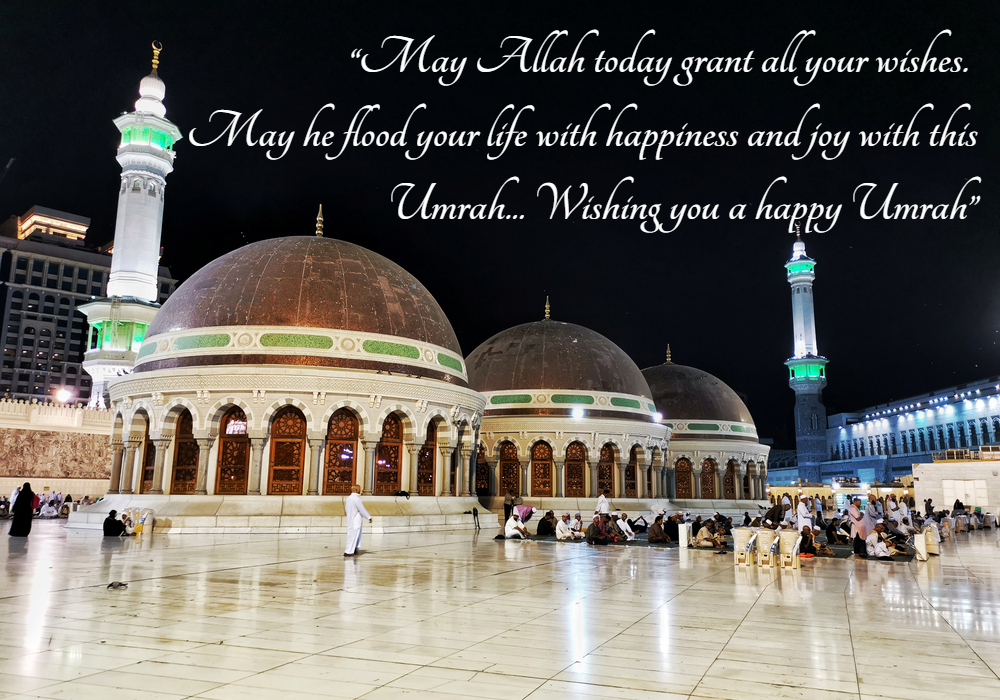
Kin must wish for a safe journey and an amazing trip for those going for Umrah. These beautiful messages will make their day and keep them in good spirits. One should congratulate Muslim brothers and sisters on going for Umrah and always ask Allah to invite them there as well.